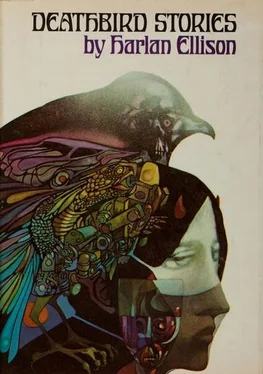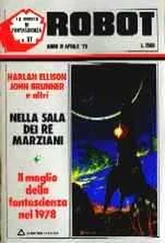And then there was silence.
That lasted for a moment.
And then there was soft music that demanded nothing but inattention. So they lay there, fitted together, in the heat of the tiny room, and they slept for some hours.
After that, Rudy seldom went out into the light. He did the shopping at night, wearing shades. He emptied the garbage at night, and he swept down the front walk, and did the front lawn with scissors because the lawnmower would have annoyed the residents of the lanai apartments (who no longer complained, because there was seldom a sound from The Hill).
He began to realize he had not seen some of the eleven young people who lived in The Hill for a long time. But the sounds from above and below and around him in the house grew more frequent.
Rudy’s clothes were too large for him now. He wore only underpants. His hands and feet hurt. The knuckles of his fingers were larger, from cracking them, and they were always an angry crimson.
His head always buzzed. The thin perpetual odor of pot had saturated into the wood walls and the rafters. He had an itch on the outside of his ears he could not quell. He read newspapers all the time, old newspapers whose items were imbedded in his memory. He remembered a job he had once held as a garage mechanic, but that seemed a very long time ago. When they cut off the electricity in The Hill, it didn’t bother Rudy, because he preferred the dark. But he went to tell the eleven.
He could not find them.
They were all gone. Even Kris, who should have been there somewhere.
He heard the moist sounds from the basement and went down with fur and silence into the darkness. The basement had been flooded. One of the eleven was there. His name was Teddy. He was attached to the slime-coated upper wall of the basement, hanging close to the stone, pulsing softly and giving off a thin purple light, purple as a bruise. He dropped a rubbery arm into the water, and let it hang there, moving idly with the tireless tide. Then something came near it, and he made a sharp movement, and brought the thing up still writhing in his rubbery grip, and inched it along the wall to a dark, moist spot on his upper surface, near the veins that covered its length, and pushed the thing at the dark-blood spot, where it shrieked with a terrible sound, and went in and there was a sucking noise, then a swallowing sound.
Rudy went back upstairs. On the first floor he found the one who was the blonde girl, whose name was Adrianne. She layout thin and white as a tablecloth on the dining room table as three of the others he had not seen in a very long while put their teeth into her, and through their hollow sharp teeth they drank up the yellow fluid from the bloated pus-pockets that had been her breasts and her buttocks. Their faces were very white and their eyes were like sootsmudges.
Climbing to the second floor, Rudy was almost knocked down by the passage of something that had been Victor, flying on heavily ribbed leather wings. It carried a cat in its jaws.
He saw the thing on the stairs that sounded as though it was counting heavy gold pieces. It was not counting heavy gold pieces. Rudy could not look at it; it made him feel sick.
He found Kris in the attic, in a corner breaking the skull and sucking out the moist brains of a thing that giggled like a harpsichord.
“Kris, we have to go away,” he told her. She reached out and touched him, snapping her long, pointed, dirty fingernails against him. He rang like crystal.
In the rafters of the attic Jonah crouched, gargoyled and sleeping. There was a green stain on his jaws, and something stringy in his claws.
“Kris, please,” he said urgently.
His head buzzed.
His ears itched.
Kris sucked out the last of the mellow good things in the skull of the silent little creature, and scraped idly at the flaccid body with hairy hands. She settled back on her haunches, and her long, hairy muzzle came up.
Rudy scuttled away.
He ran loping, his knuckles brushing the attic floor as he scampered for safety. Behind him, Kris was growling. He got down to the second floor and then to the first, and tried to climb up on the Morris chair to the mantel, so he could see himself in the mirror, by the light of the moon, through the fly-blown window. But Naomi was on the window, lapping up the flies with her tongue.
He climbed with desperation, wanting to see himself. And when he stood before the mirror, he saw that he was transparent, that there was nothing inside him, that his ears had grown pointed and had hair on their tips; his eyes were as huge as a tarsier’s and the reflected light hurt him.
Then he heard the growling behind and below him.
The little glass goblin turned, and the werewolf rose up on its hind legs and touched him till he rang like fine crystal.
And the werewolf said with very little concern, “Have you ever grooved heavy behind anything except love?”
“Please!” the little glass goblin begged, just as the great hairy paw slapped him into a million coruscating rainbow fragments all expanding consciously into the tight little enclosed universe that was The Hill, all buzzing highly contacted and tingling off into a darkness that began to seep out through the silent wooden walls….
The new gods move in mysterious ways, their will to make known: business as usual, with miracles as loss-leaders. Brings to mind the ancient Chinese admonition, “Be careful what you wish for…you might get it. “
Delusion for a Dragon Slayer
This is true:
Chano Pozo, the incredibly talented conga drummer of the bop ‘408, was inexplicably shot and killed by a beautiful Negress in the Rio Cafe, a Harlem bar, on December 2nd, 1948.
Dick Bong, pilot of a P-38 “Lightning” in World War Two, America’s “Ace of Aces” with forty Japanese kills to his credit, who came through the hellfire of war unscratched, perished by accident when the jet engine of a Lockheed P-80 he was test-flying “flamed-out” and quit immediately after takeoff, August 7th, 1945. There was no reason for the mechanical failure, no reason for Bong to have died.
Marilyn Monroe, an extremely attractive young woman who had only recently begun to realize she possessed an acting ability far beyond that of “sex symbol” tagged on her early in her career, during the timeless early hours of August 6th, 1962, left this life as a result of accidentally swallowing too many barbiturates. Despite lurid conjecture to the contrary, the evidence that she had been trying to phone someone for help as the tragedy coursed through her system remains inescapable. It was an accident.
William Bolitho, one of the most incisive and miraculously talented commentators on society and its psychological motivations, whose “Murder for Profit” revolutionized psychiatric and penological attitudes toward the mentalities of mass murderers, died suddenly—and again, tragically—in June of 1930, in a hospital in Avignon, victim of the mistaken judgment of an obscure French physician who let a simple case of appendicitis drop into peritonitis.
True.
All of these random deaths plucked from a staggering and nearly endless compendium of “accidental tragedies” have one thing in common. With each other, and with the death of Warren Glazer Griffin. None of them should have happened. Each of them could have been avoided, yet none of them could have been avoided. For each of them was preordained. Not in the ethereal, mystic, supernatural flummery of the Kismet-believers, but in the complex rhythmic predestination of those who have been whisked out of their own world, into the mist-centuries of their dreams.
For Chano Pozo, it was a dark and smiling woman of mystery.
For Dick Bong, a winged Fury sent to find only him.
Читать дальше












